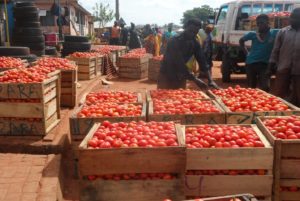Increased public education needed to reduce food waste in homes – Research Scientist
 Dr Stella Agyemang Duah, a Research Scientist at the Ghana Atomic Energy Commission (GAEC), has called for increased public education and an awareness campaign on food wastage in Ghanaian homes.
Dr Stella Agyemang Duah, a Research Scientist at the Ghana Atomic Energy Commission (GAEC), has called for increased public education and an awareness campaign on food wastage in Ghanaian homes.
She said food wastage which was one of the prevalent global challenges impeded economic growth, cause health problems and great toll on sanitation in society.
It was therefore important for Ghanaians to adopt effective measures to reduce food wastage in their homes.
Dr Agyeman Duah made the call at the maiden Stop Food Wastage campaign in Kumasi.
The campaign which was organized by GAEC in partnership with the Kumasi Metropolitan Assembly (KMA), brought together students from various tertiary institutions and stakeholders in environmental health and sanitation.
It was held under the theme “educating and igniting change in the Ghanaian for national development”.
The campaign, according to Dr Agyemang Duah aimed at generating strategies to aid in overcoming constraints, influence development processes and enhance awareness creation in the reduction of food waste in Ghana.
It would also create a cost-efficient system that supported hunger alleviation through the development of a software application to aid in identifying and collating data on food waste.
Again, it would create a national public awareness about the efficient organic waste management mechanisms and work with partners to promote segregate waste bin distribution.
The Researcher observed that in Ghana the level of wastage had not changed due to perception people had about buying their own food, and other attitudinal barriers.
It is estimated that Ghana generates about 22,500 tonnes of waste per day, about 60 per cent of which is organic.
According to a food waste survey data (2017-2021), households generated 32 per cent of food waste, funerals recorded 21 per cent, markets were 20 per cent, parties recorded 16 per cent and school pantries had 10.7 per cent.
Dr Agyemang Duah said the exposure of the environment to wasted food that ended up in landfill sites contributed to about 12 per cent emission of anthropogenic gases.
She therefore suggested that unavoidable waste like cassava peels, yam peels and plantain peels should be converted into composting and fertilizers in farming to repeat the production chain.
This would help reduce the high cost of importing fertilizers from other countries.
Source: GNA
